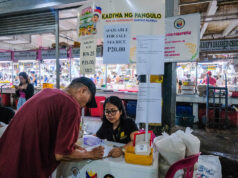AYALA CORP. (AC) is mapping out a “much more short-term” approach to business, focusing on employee management and business resiliency amid the coronavirus pandemic.
AC Chairman and Chief Executive Officer Jaime Augusto Zobel de Ayala unveiled the company’s three-phased approach to the evolving COVID-19 situation at the annual meeting held online on Friday.
“We’ve always thought long-term, we’ve always focused on the future, but you get a crisis of this nature… (with) no existing playbook… we had to shorten our cycle of planning…,” he said.
The plan, which runs until the fourth quarter of 2020, has three phases — workforce re-entry, market re-evaluation and business repositioning.
Phase 1 involves preparations for the continuation of work once the enhanced community quarantine (ECQ) is lifted. As the government announced the extension of ECQ in the Metro Manila and other regions until mid-May, Mr. Zobel said this period will be spent planning for the post-ECQ work environment of Ayala units.
“We’re worrying a great deal and thinking through how do we get our employee force back to be productive, but at the same time, healthy and safe in this new environment,” he said.
Mr. Zobel noted part of AC’s workforce continues to work in the frontlines, particularly those working in its banking, telecommunications, water utility and healthcare units.
Phase 2 would cover covers the months until June after the ECQ is expected to be lifted. Mr. Zobel said AC intends to spend this time studying consumer behavior, market behavior, industry regulatory issues, and basically “how the world has changed for us.”
“Technology is really a hugely transformational issue in this next period, and we will have to see over the next two months after the ECQ how things evolve,” he said.
Mr. Zobel said the conglomerate wants to focus on how it can strengthen its digital infrastructure to support the renewed role of technology. He cited the overwhelming take-up of its digital platforms, like the mobile application of Bank of the Philippine Islands (BPI) and mobile wallet GCash of Globe Telecom, Inc. as the ECQ forced consumers to turn to electronic payment platforms.
“Maybe just one statistic: our BPI online banking had more online users in just one month than all the online users we’ve had for the full year last year… We’re very happy about the infrastructure that we’ve built up to support this over many years. It’s taken some pain in the past but we’re sure glad that we took the time to do that in the past,” Mr. Zobel said.
For Phase 3, which will cover the second half of 2020, AC may start planning for the “new normal.”
“As we start to understand the situation a little better, (we) then adjust our work force and our market tactics to this new reality that we’ve engaged,” Mr. Zobel said.
The company aims to balance well-being and productivity for employees,
retaining customers, and ensuring operational and financial sustainability.
While the plan is very short-term in nature, Mr. Zobel believes this is the best way to “really tackle this new environment in a productive, innovative and intelligent way as we move on.”
Meanwhile, AC’s healthcare unit Ayala Healthcare Holdings, Inc. (AC Health) is eyeing to play a bigger role in helping the country’s healthcare system address the COVID-19 situation, and support whatever will be the post-pandemic environment.
AC Health President and Chief Executive Officer Paolo Maximo F. Borromeo said the company is looking to strengthen its clinical network through FamilyDOC and Healthway clinics to accommodate non-COVID-19 patients while triaging COVID-19-related cases.
It is also planning to revamp clinics to accommodate other patients, like converting its Healthway Greenbelt clinic into a chemo facility for cancer patients.
The company likewise plans to boost its health technology platforms AIDE and MedGrocer, which give customers remote access to at-home services and online medicine delivery.
Its pharmacy distribution and retailing business is also primed for expansion in capacity, as Mr. Borromeo said he expects reliable access to medicines and vitamins to be essential.
Following AC Health’s partnership with QualiMed to convert its Sta. Rosa facility into a COVID-19 hospital, Mr. Borromeo said the companies are in talks to explore more enhancements in other QualiMed hospitals.
AC is the parent company of Ayala Land, Inc.; Globe; BPI; AC Energy, Inc.; Manila Water Co., Inc.; AC Industrials; and AC Health, among others. The conglomerate booked a net income of P35.28 billion in 2019, up 11% year-on-year.
Shares in AC at the stock exchange lost P13 or 2.31% to P550 each on Friday. — D.A.Valdez



